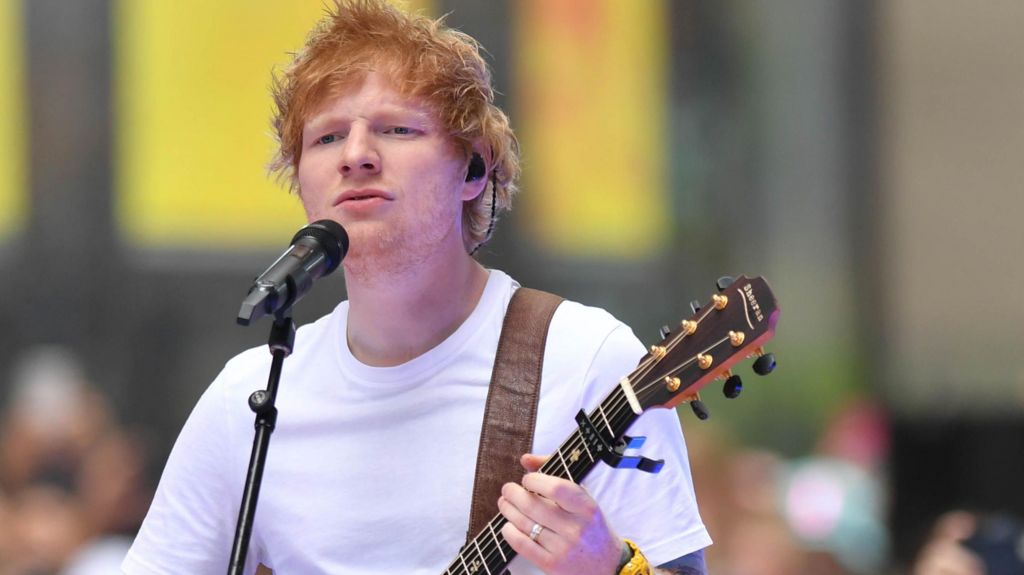Spotify paid the UK music industry £750m last year

Spotify says music by UK recording artists generated £750 million in royalties on its platform last year.
Almost 1,000 artists were played often enough to generate at least £100,000 in royalties each, the company added.
The figures were revealed as part of Spotify's "Loud and Clear" campaign, which aims to provide transparency on how it pays the music industry.
However, the company is unable to say how much of those royalty payments actually goes to musicians.
That's because every artist has a different contract with their record label and publishers, which determines how the money is divided.
The artist's share is often around 16%, a committee of MPs heard in 2021.
That would mean an artist whose music generated £100,000 on Spotify might only receive £16,000 in royalty payments, before tax.
However, Spotify is not the only source of revenue.
The Swedish company has about a 50% share of the UK music streaming market, according to the CMA, which means artists could make the same amount again via platforms like Apple Music, Amazon Music and Tidal.
English-language songs losing popularity
Ed Sheeran was the most popular British artist on Spotify last year, with his songs played 6.35 billion times.
Coldplay came second with 5.58 billion streams, followed by Harry Styles with 5.11 billion streams.
However, British artists were unable to crack Spotify's Top 10 most-played chart, which was topped by Taylor Swift (on 29 billion streams) and also featured Puerto Rican star Bad Bunny, Mexico's Peso Pluma and Colombia's Karol G.

The shift suggests that speaking English is no longer a pre-requisite for global music success.
More than half the artists who generated $10,000 (£8,000) on Spotify last year are from countries where English is not the first language, the company said.
English is still the top language for music globally, accounting for 54.9% of the top 10,000 songs. But its share of the market is falling, with languages like Hindi and Japanese making gains.
"It's really interesting time for music," said Spotify UK's head of artists and industry partnerships, Bryan Johnson.
"In the past few years, we've seen genres like K-pop and Amapiano take off, and now Music Mexicana is really starting to travel.
"The choice now for fans and listeners is incredible."
He noted that 75% of all the royalties paid to UK artists came from international listeners - suggesting there is still a "huge export opportunity" as the streaming market matures.
Johnson added that independent artists and labels received 40% of the UK's royalty payments - a total of £300 million.
They typically receive a higher share of the proceeds, with artists who self-release music (ie without the help of a record label or distributor) sometimes keeping 100% of the income their songs generate.
Payouts stopped
However, Spotify has come under fire recently for demonetising songs with fewer than1,000 streams.
That means the copyright holders will not be paid at all, if the song falls below that threshold in a 12-month period.
Critics have complained that the policy means will "enrich the top of the pyramid" and starve working musicians of money.
But Johnson said the policy was designed to filter out "spam", and thwart fraudulent activity.
Spotify has previously noted that 1,000 plays only generates a "micro-payment" of around $0.25 (£0.20) that artists rarely see - because distributors often set a minimum threshold before artists can withdraw money.
In 2024, the company expects that the new policy will divert $40 million (£32 million) to more popular songs.
"This is not something that Spotify takes," said Johnson. "The money goes back into the pool... to emerging and professional artists."
This year marks the first time that Spotify has disclosed its figures for UK payouts. It says the total of £750 million has doubled since 2017.
Earlier this year, the company announced it had paid $9 billion (£7.2 billion) in royalties worldwide last year, making it the biggest single contributor to the music industry's revenues.
YouTube, once the thorn in the industry's side, is thought to be the industry's second largest source of income.
In February, it said it had paid out $6 billion (£4.8 billion) to rights-holders last year.
Article From & Read More ( Spotify paid the UK music industry £750 million last year - BBC.com )https://ift.tt/lV8qNsZ
Entertainment
No comments:
Post a Comment